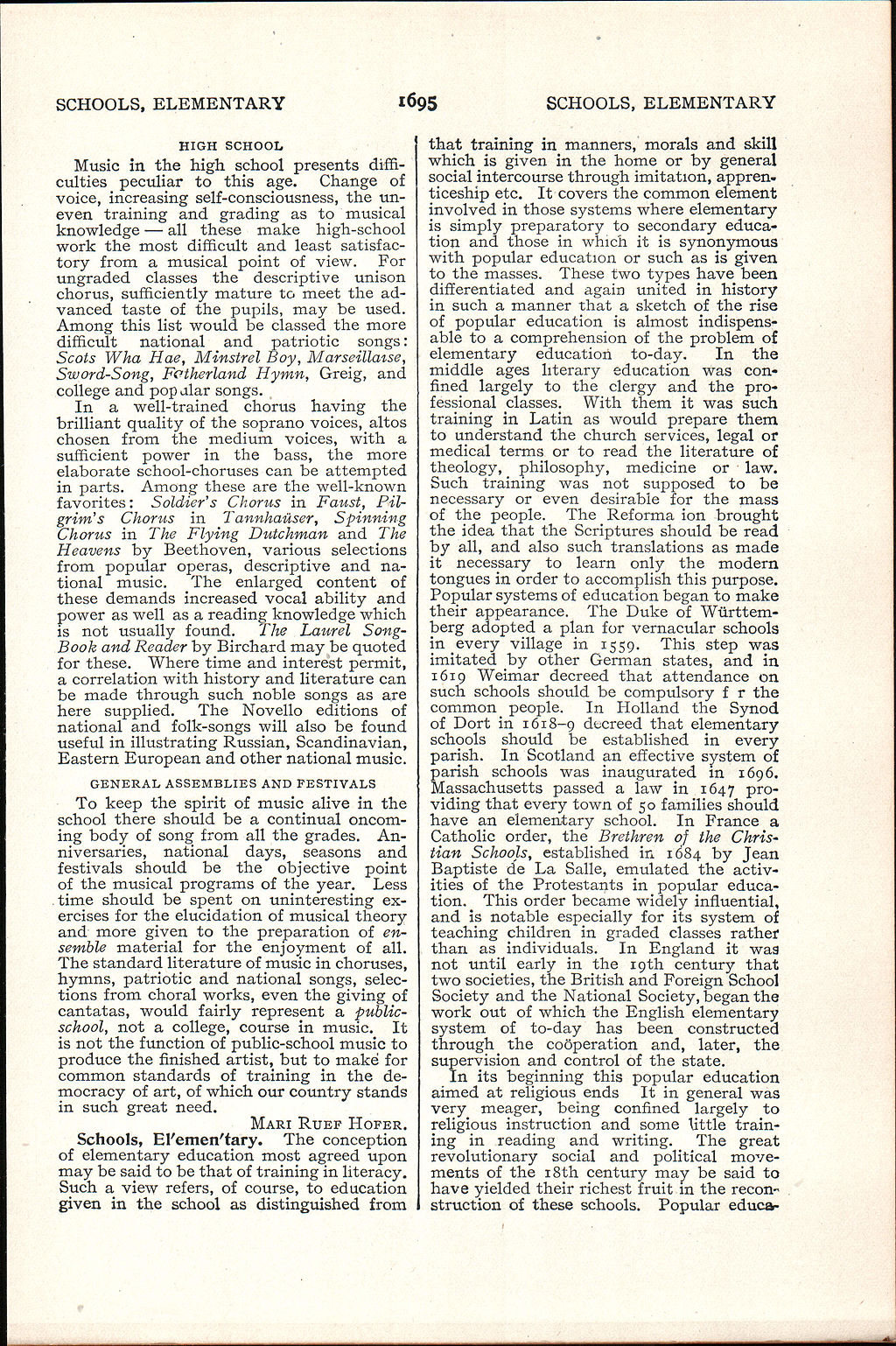HIGH SCHOOL
Music in the high school presents difficulties peculiar to this age. Change of voice, increasing self-consciousness, the uneven training and grading as to musical knowledge — all these make high-school work the most difficult and least satisfactory from a musical point of view. For ungraded classes the descriptive unison chorus, sufficiently mature to meet the advanced taste of the pupils, may be used. Among this list would be classed the more difficult national and patriotic songs: Scots Wha Hae, Minstrel Boy, Marseillaise, Sword-Song, Fatherland Hymn, Greig, and college and popular songs.
In a well-trained chorus having the brilliant quality of the soprano voices, altos chosen from the medium voices, with a sufficient power in the bass, the more elaborate school-choruses can be attempted in parts. Among these are the well-known favorites: Soldier's Chorus in Faust, Pilgrim's Chorus in Tannhaüser, Spinning Chorus in The Flying Dutchman and The Heavens by Beethoven, various selections from popular operas, descriptive and national music. The enlarged content of these demands increased vocal ability and power as well as a reading knowledge which is not usually found. The Laurel Song-Book and Reader by Birchard may be quoted for these. Where time and interest permit, a correlation with history and literature can be made through such noble songs as are here supplied. The Novello editions of national and folk-songs will also be found useful in illustrating Russian, Scandinavian, Eastern European and other national music.
GENERAL ASSEMBLIES AND FESTIVALS
To keep the spirit of music alive in the school there should be a continual oncoming body of song from all the grades. Anniversaries, national days, seasons and festivals should be the objective point of the musical programs of the year. Less time should be spent on uninteresting exercises for the elucidation of musical theory and more given to the preparation of ensemble material for the enjoyment of all. The standard literature of music in choruses, hymns, patriotic and national songs, selections from choral works, even the giving of cantatas, would fairly represent a public-school, not a college, course in music. It is not the function of public-school music to produce the finished artist, but to make for common standards of training in the democracy of art, of which our country stands in such great need.
Schools, El′emen′tary. The conception of elementary education most agreed upon may be said to be that of training in literacy. Such a view refers, of course, to education given in the school as distinguished from that training in manners, morals and skill which is given in the home or by general social intercourse through imitation, apprenticeship etc. It covers the common element involved in those systems where elementary is simply preparatory to secondary education and those in which it is synonymous with popular education or such as is given to the masses. These two types have been differentiated and again united in history in such a manner that a sketch of the rise of popular education is almost indispensable to a comprehension of the problem of elementary education to-day. In the middle ages literary education was confined largely to the clergy and the professional classes. With them it was such training in Latin as would prepare them to understand the church services, legal or medical terms or to read the literature of theology, philosophy, medicine or law. Such training was not supposed to be necessary or even desirable for the mass of the people. The Reformation brought the idea that the Scriptures should be read by all, and also such translations as made it necessary to learn only the modern tongues in order to accomplish this purpose. Popular systems of education began to make their appearance. The Duke of Württemberg adopted a plan for vernacular schools in every village in 1559. This step was imitated by other German states, and in 1619 Weimar decreed that attendance on such schools should be compulsory for the common people. In Holland the Synod of Dort in 1618-9 decreed that elementary schools should be established in every parish. In Scotland an effective system of parish schools was inaugurated in 1696. Massachusetts passed a law in 1647 providing that every town of 50 families should have an elementary school. In France a Catholic order, the Brethren of the Christian Schools, established in 1684 by Jean Baptiste de La Salle, emulated the activities of the Protestants in popular education. This order became widely influential, and is notable especially for its system of teaching children in graded classes rather than as individuals. In England it was not until early in the 19th century that two societies, the British and Foreign School Society and the National Society, began the work out of which the English elementary system of to-day has been constructed through the coöperation and, later, the supervision and control of the state.
In its beginning this popular education aimed at religious ends. It in general was very meager, being confined largely to religious instruction and some little training in reading and writing. The great revolutionary social and political movements of the 18th century may be said to have yielded their richest fruit in the reconstruction of these schools. Popular educa-
